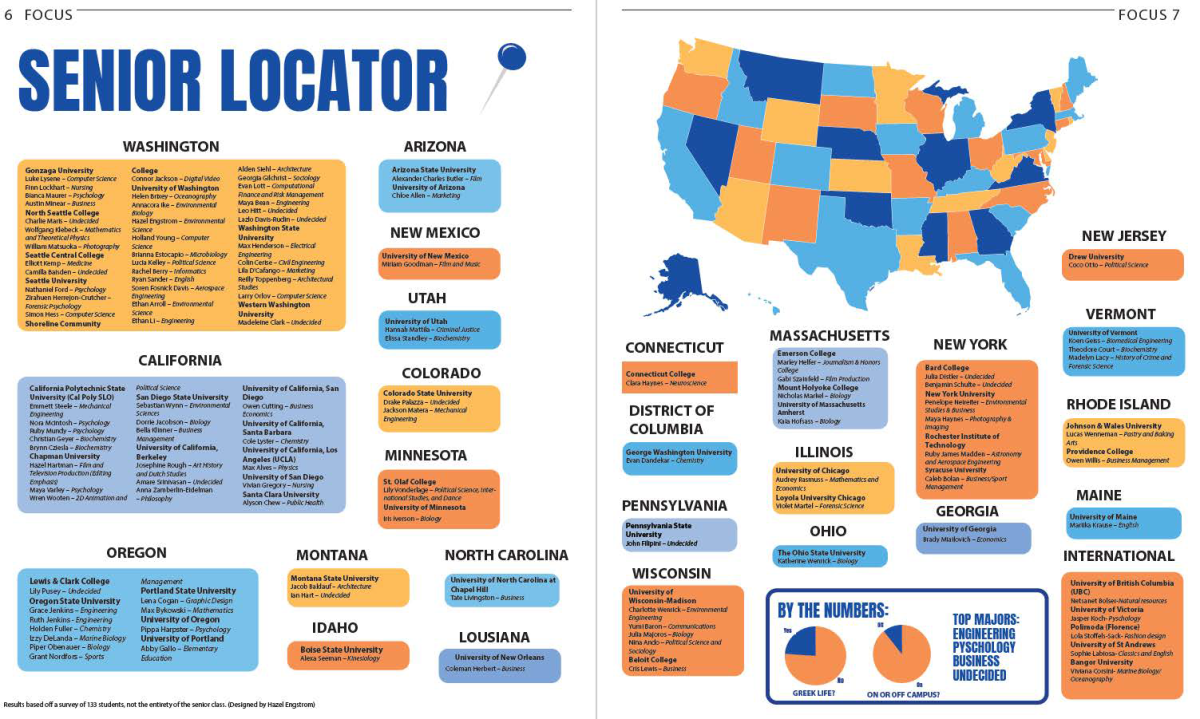Brazilian student-athlete’s transition to Seattle
Since moving here, exchange student Eduardo Lavander of Rio de Janeiro has experienced differences in school, soccer and other aspects of life
Eduardo Lavender of Rio Grande, Brazil warming up pre-game. “In Brazil, we play sports [separate] from school,” Lavender said. “Here you see everybody playing sports after school, and it’s interesting because we don’t have this in Rio Grande.” (Finn Keenan)
April 24, 2023
Brazilian Eduardo Lavander, known by most as “Dudu”, is participating in a six month exchange student program, and has joined the boys’ varsity soccer team.
Traveling over 6,000 miles to come here, Lavander has observed drastic differences when comparing life in Seattle to that of Rio de Janeiro.
Lavander noted that Seattle is much more car-centric than his hometown.
“In Brazil you usually walk or ride a bike every place,” Lavander said. “Here I know that I need to get a ride to go places; things are more spread out,” Lavander said. “You can’t drive [at age] 16 in Brazil, we just can drive [at age] 18, so it’s a big difference.”
Being from a tropical climate, Lavander also said that the cold weather was one of the most noticeable differences.
Lavander said that sports are structured differently in Brazil.
“In Brazil, we play sports [separate] from school,” Lavander said. “Here you see everybody playing sports after school, and it’s interesting because we don’t have this in Rio De Janeiro.”
Despite being from Brazil, a country that has historically been a dominant force in the soccer/football world, Lavander has been impressed by the level of play here in Seattle.
“I was really impressed because I thought it [would] be so different, but it’s not,” Lavander said. “My varsity team is so good…it’s relatively similar [to] how it is in Brazil.”
Because of Brazil’s prestige in the sport, Lavander initially noticed a high set of expectations for him as a player.
“When I said ‘I’m from Brazil and I play soccer,’ everybody [was] like ‘oh my god, Neymar?’ but I like the expectation, [it] makes me improve myself more,” Lavander said.
Even though Lavander considers the level of play here to be more or less on par with the level of play in Brazil, he has noticed a substantially different style of play.
“Here, I’ve seen that you use your body [to] make plays, but in Brazil, you create your own skills in the game, [and] it’s more for you,” Lavander said. “I prefer how we play here…I like how the team works when you pass to make plays.”
Lavander primarily plays midfield and center back, where he focuses on distributing the ball upfield to initiate attacks and counterattacks.
“I really like to play for the team, so I like to read the play for the team and help make plays upfield,” Lavander said.
Along with the adjustments to the style of game, Lavander has also had to adapt to differences off the pitch.
“It is difficult because I am changing my language…every single day I learned about Portuguese and now it’s different,” Lavander said.
“I think I’m doing pretty well. I have some friends already and I like my team.”
Lavander appreciates the variety of classes offered in American high schools.“There are a lot of classes to choose from and a lot of different sports that you can do,” Lavander said.
“I like the kind of freedom that this school gives you. [Also], Ballard’s about four times bigger than my other school, so it’s interesting.”
Lavander said that his favorite classes are weight training and algebra.
Lavander shared some closing thoughts about his experience as a high school exchange student.
“In my first two months in Seattle, it was a really [big] change in my [life],” Lavander said. “How I live, how I do my breakfast, how I eat, how I drink, everything is different. But I’m really enjoying [it] because it’s a unique experience.”
























![Eduardo Lavender of Rio Grande, Brazil warming up pre-game. “In Brazil, we play sports [separate] from school,” Lavender said. “Here you see everybody playing sports after school, and it’s interesting because we don’t have this in Rio Grande.” (Finn Keenan)](https://ballardtalisman.org/wp-content/uploads/2023/04/dudu-600x900.jpg)
